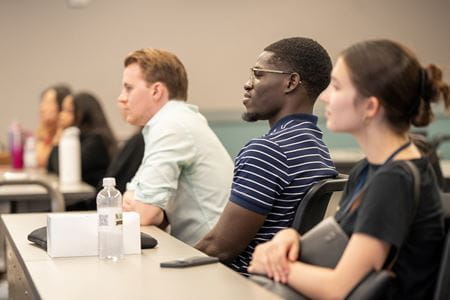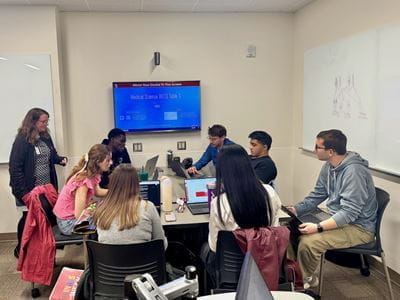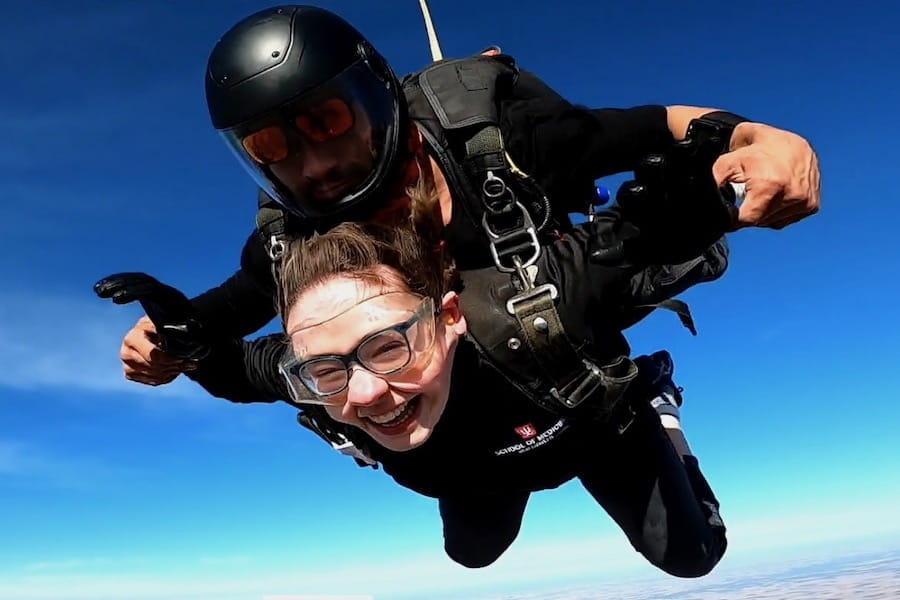Five months ago, Mout-Maine Moustapha was going through orientation at the Indiana University School of Medicine, filled with expectation as he took his first steps on the journey toward becoming a medical doctor. Now he has stepped into leadership with the Medical Student Council as president of the Class of 2028.
“I was pleasantly surprised by the strong sense of camaraderie that developed among my classmates,” said Moustapha, reflecting on his first semester as a medical student. “Despite the competitive nature often associated with medical school, I found a supportive community where collaboration and mutual support were the norm.”
As class president, Moustapha will represent his peers throughout their four years of medical school. Class officers and regional chairs ensure that all student voices are represented at Medical Student Council. Moustapha took on another leadership role with the school’s chapter of the Student National Medical Association as its first-year representative. SNMA works to increase the number of physicians who serve marginalized and indigent communities.
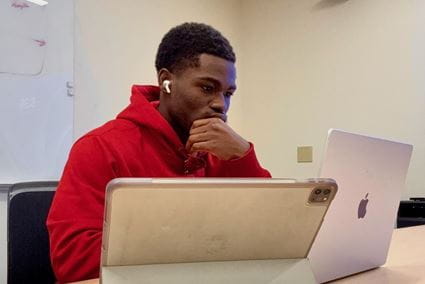 A natural leader with an inquisitive nature and a warm smile, Moustapha reported “a rapid pace of personal and academic growth” in semester one. Phase 1 of the medical school curriculum focuses on developing foundational science knowledge and its integration with clinical skills.
A natural leader with an inquisitive nature and a warm smile, Moustapha reported “a rapid pace of personal and academic growth” in semester one. Phase 1 of the medical school curriculum focuses on developing foundational science knowledge and its integration with clinical skills.
“The sheer volume of information we were expected to absorb and integrate was initially overwhelming, but I was amazed at how quickly I adapted to this intense learning environment,” Moustapha said.
He chose to take his Foundations of Clinical Practice (FCP) course in a special section that emphasizes cultural competence and Spanish medical language. Moustapha’s French-Beninese heritage exposed him to world languages early, and he picked up Spanish as an undergrad at IU.
“Participating in the Spanish FCP small group enhances my medical Spanish skills and cultural competency, preparing me to better serve Hispanic and Latino patients in the future,” he said.
Moustapha also enjoys the built-in mentorship offered by the School of Medicine’s new Professional Learning Communities (PLC) program. He’s part of a dozen students in the Hickory PLC, led by physician mentors Leilani Mullis, MD and William Swigart, MD.
“At our PLC dinners, we all enjoy playing games and eating delicious meals, either at our mentors’ houses or at restaurants, usually before exams,” Moustapha said.
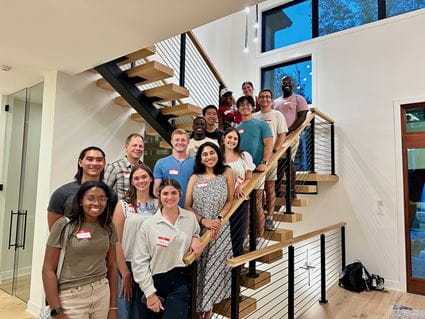 Challenges in his first semester included time management, adapting to new learning methods, developing emotional resilience and overcoming imposter syndrome — all typical while adjusting to the rigors of medical school.
Challenges in his first semester included time management, adapting to new learning methods, developing emotional resilience and overcoming imposter syndrome — all typical while adjusting to the rigors of medical school.
“I had to learn to manage anxiety, particularly around exams and clinical skills assessments, while maintaining my motivation and passion for medicine,” Moustapha said.
Regular workouts at the gym and intentionality about nutrition, hydration and sleep helped him cope. When studying, Moustapha practices the Pomodoro Method, a time management technique with focused 25-minute intervals separated by 5-minute breaks.
Heading into his second semester as an IU medical student, Moustapha looks forward to building knowledge and relationships as he continues the journey to MD.
Q&A with Mout-Maine Moustapha, Class of 2028 president
Question: What has been the highlight of your first semester as a medical student?
Answer: The highlight of my first semester has been the opportunity to interact with patients during my assigned clinical preceptor visits. I am assigned to Dr. Karuna Auble-Iyer at IU Health Primary Care—Fishers, where I join her at the clinic once a month. These patient interactions have not only enhanced my understanding of medical practice but also reinforced my passion for pursuing a career in medicine. The ability to engage with patients early in my medical education has been invaluable.
Q: What is something that has surprised you?
A: One unexpected aspect was the immediate relevance of our studies to real-world medical scenarios, which brought our learning to life in ways I hadn't anticipated. The emphasis on early clinical exposure and patient interaction was both challenging and rewarding, providing a tangible connection to our future roles as health care providers. I was also struck by the holistic approach to medical education, which encompassed not just scientific knowledge but also emphasized the development of empathy, communication skills and ethical reasoning. This comprehensive approach to becoming a physician was more multifaceted and enriching than I had initially expected.
Q: What challenges have you navigated?
A: The most pressing challenge was balancing the intensive academic workload with personal well-being. I had to quickly develop effective study strategies and prioritization skills to manage the vast amount of information while still maintaining a healthy lifestyle.
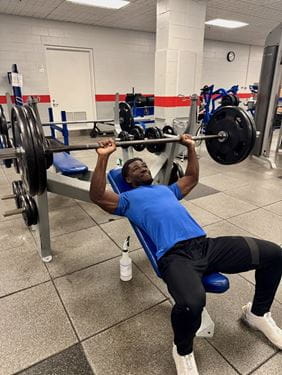
Q: What wellness practices have you adopted to help manage stress?
A: Regular exercise is a cornerstone of my routine. Additionally, I prioritize social connections by making time to dine out with classmates and family members whenever possible, as these interactions foster important relationships and provide a sense of community. I also pay attention to maintaining a nutritious diet to support both my physical health and cognitive function.
Q: What are you most looking forward to in the second half of Year One?
A: I am most excited about deepening my clinical skills and further integrating my medical knowledge. Building on the foundational concepts I learned in the first semester, I anticipate engaging more actively in patient interactions as I volunteer at the Student Outreach Clinic or during my clinical preceptor visits.
About this series:
Journey to MD will follow two Indiana University School of Medicine students throughout their four-year academic journeys, chronicling their experiences from orientation week through graduation. Read more about Moustapha’s background and the experiences that led him to medical school.
